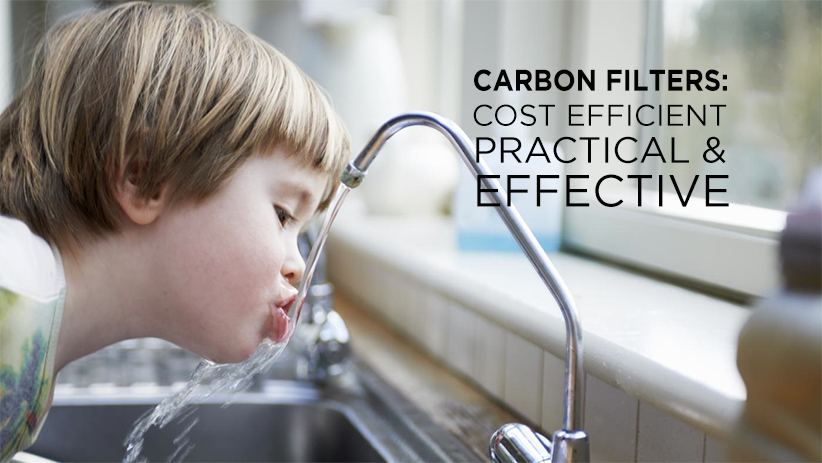Carbon plays multiple roles in Water Treatment. It is efficient in removing certain chemicals, especially organic compounds, and improves the taste and clarity of drinking water.
Why Carbon Filters?
Your tap water may come in contact with radon, benzene, solvents, trihalomethanes, volatile organic chemicals (pesticides and herbicides) and hundreds of other man-made chemicals before entering your home. Carbon Filters are a great option to remove these impurities.
You can use this type of filter to remove chemicals that give unpleasant odor or taste to water. Also, for chemicals like chlorine and its by-products, hydrogen sulfide (rotten egg odor), and some forms of iron.
These Substances if Not Removed Can Pose Health Risks!
Removing substances from your water is vital since it can cause cancer, neurological problems and present other health risks.
Carbon Filters are made from raw, organic materials such as coconut shell, anthracite or bituminous coal and wood. Carbon is probably the most absorbent material known to man. It is very efficient since activated carbon has thousands of tiny cracks that millions of unwanted particles attach to as water passes through it.
Carbon Filter Types
Whole-House Filter
We install a Whole-House Filter at the main water line where water first enters the home. Delivering the same high-quality filtered water to every faucet in your home. Kitchen and bathroom sinks, showers and bathtubs, washing machine, dishwasher, all of it with have the Best water.
This is especially important because the Whole House Carbon Filter removes chlorine and its carcinogenic by-products that we absorb through lungs and skin in the shower, and bathtub. Inhalation is a concern since chlorine is a volatile gas that escapes from water into the air.
Point of Use Filter
We install a Point of Use Filter at the water supply pipe just before a faucet, typically the kitchen sink. From it, filtered water flows to a separate water tap next to the main faucet. We do not treat water at the main faucet (hot or cold).
With this system, you will have an unlimited supply of clean delicious water in your kitchen. Your system will pay for itself by eliminating the cost of buying bottled water.
An under-sink filter protects you from ingesting contaminants by treating your drinking and cooking water. However, it will not safeguard you from the risk of exposure to chlorine and its carcinogenic by-products in the shower or bathtub like a Whole-House Filter would.
Carbon Filter Maintenance
Whole House Carbon Filters have a life expectancy of 2 to 3 years. The life cycle of Point of Use Filters is approximately 1 year. They should be replaced before they breakdown and start releasing contaminants into the water supply.
Carbon Filters Don’t Remove
Carbon Filters do not remove dissolved inorganic contaminants and heavy metals. Things like minerals, salts, fluoride, arsenic, copper, mercury, nickel, nitrates and other contaminants. Reverse Osmosis, or Water Distillers are necessary to remove these impurities.
Determining Need and Type of Carbon Filter for your Home
The first step is a water analysis and consultation with one of our Water Specialist. If you are interested in learning more about what is in your Water or would like to tell us about any issues you are experiencing with your water, call us:
Gainesville: (352) 372-2707 – Ocala: (352) 369-1707
Or Email us: info@BestWaterSolutions.com
One of our Water Specialist will answer your questions and assist you in making the decision that is in your best interest.
